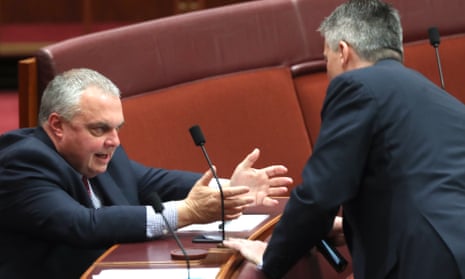The Centre Alliance senator Stirling Griff says it is “most unlikely” the Coalition will be able to pass its full income tax cut package in the first week of July when parliament returns, and has joined Labor’s call for the government to split the legislation.
Griff, who is one of two key crossbench senators in negotiations with the government over the $158bn tax cut package, said he was waiting for a response from Treasury and the Coalition after the party outlined its demands on energy policy.
The party wants the Coalition to activate the existing Australian domestic gas security mechanism, which has not been used, that prevents companies exporting gas without first obtaining permission from the government.
It is also calling on Treasury to examine the likely economic impact of rising energy prices on the wider economy and cost of living, fearing any income tax cut bonus would go into the “pockets of overseas energy companies”.
He said that as negotiations with the crossbench continued on the final tranche of the tax cuts, the government could consider passing the first two stages of the package to give much-needed economic stimulus.
“No one wants hardworking Australians to miss out on their tax cut, and we know that the economy needs stimulus, and parts one and two gives it stimulus,” Griff said.
“Without them killing everything else off the routine agenda it is most unlikely that it (the full package) is going to get through in that first week.”
Griff said Centre Alliance was still open to supporting the whole package, but would wait for assurances from the government that the tax relief would not be “fleeced off by high power prices”.
“We have highlighted our concern with this, there needs to be a gas reservation policy and it is up to them (the government) to come back to us and for Treasury to come to us and tell us whether they have factored in likely energy increases in the coming years,” Griff said.
His fellow Centre Alliance senator Rex Patrick said the trigger needed to be activated as Australian companies were paying $9 a gigajoule for Australian natural gas which is sold for $7 in Asia.
Patrick proposes that if the gas price in the eastern market goes above the average rate in Western Australia or Asia, the government should use the trigger and limit exports until there is “at least” a surplus of 5% in domestic markets.
“The gas price will rise again and that will increase the cost of electricity in South Australia.
“Power price rises will consume the benefit of income tax cuts ... neutralising the effect of stimulus and making Australian industry uncompetitive.”
Patrick distanced himself from Pauline Hanson’s demands for a coal-fired power station and the Bradfield scheme for inland irrigation, noting the former is “quite prescriptive” and the latter would cost “billions” while Centre Alliance’s proposal would cost the government nothing.
“If the government gives a hospital to Jacqui [Lambie] or a coal-fired power station to Pauline [Hanson] that is not our concern.”
Labor appears to be standing firm on its demand for the Morrison government to split the bill for income tax cuts, while the Coalition is refusing to budge on its position that the package be passed in its entirety.
The Labor leader, Anthony Albanese, said if the government refused to split the legislation to ensure the first stage of relief was provided to low and middle income earners, it would be “putting politics before outcomes”.
“The government really needs to be sensible about this. We can get through the first tranche very quickly, through the parliament, with Labor and Coalition support. That is the tax cuts that are relevant for this term of government,” Albanese told Perth radio on Tuesday.
While declining to comment on the Centre Alliance proposal on the gas trigger, the resources minister, Matt Canavan, said the government’s existing policy had already reduced prices, pointing to a recent report from the Australian Competition and Consumer Commission which found LNG netback prices had fallen in the past six months.
“We continue to monitor domestic gas markets closely in the context of the government’s announced policy to ensure that domestic markets are put first and that they function effectively,” Canavan told Guardian Australia.
But the ACCC’s chair, Rod Sims, also warned at the time that high gas prices remained “a critical issue for domestic gas users”, warning that more businesses could move or close as a result.
The report showed that most commercial and industrial Australian gas users will pay more than $9 a gigajoule for gas this year, and some more than $11 a gigajoule.
“Commercial and industrial gas users have been telling us for some time that at those gas prices, their operations are not sustainable in the medium to longer term,” Sims said.
